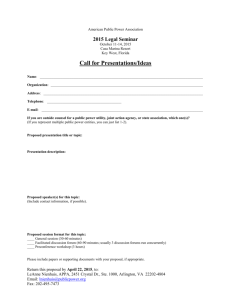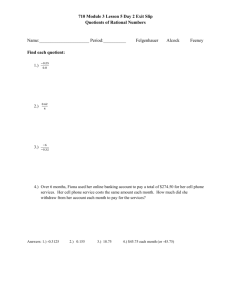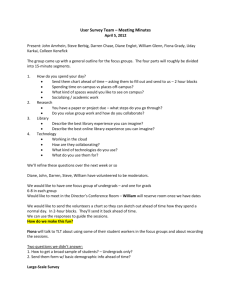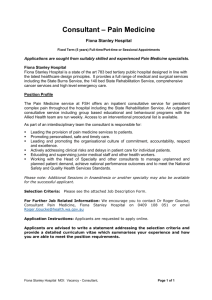62-3 Who should get the fat pill
advertisement
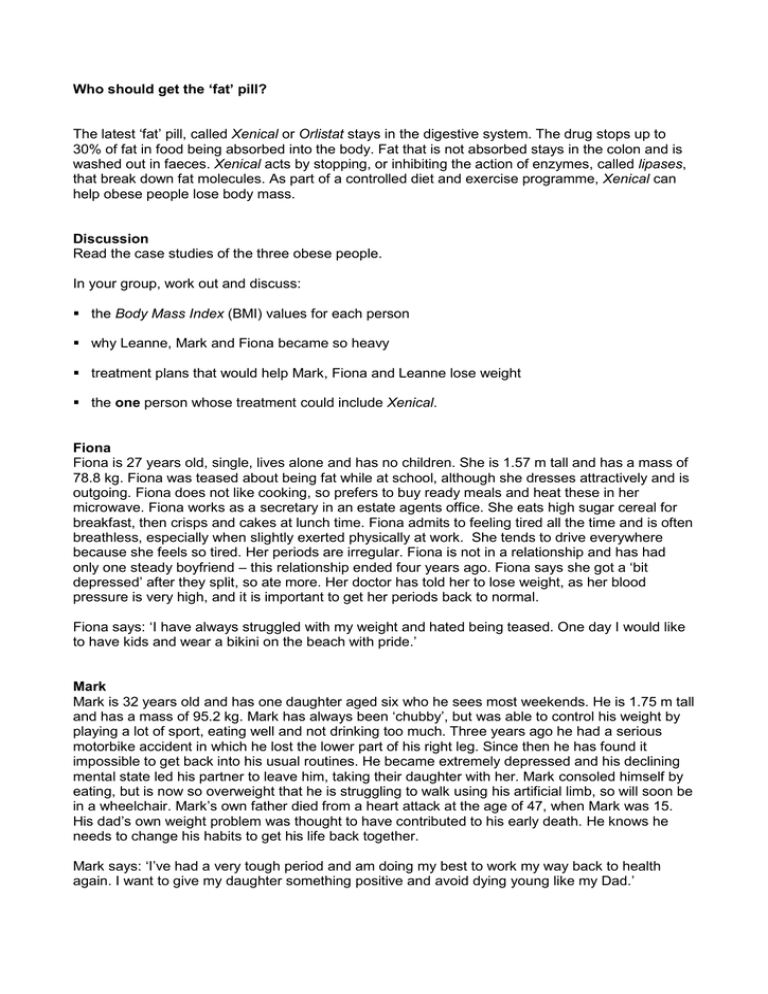
Who should get the ‘fat’ pill? The latest ‘fat’ pill, called Xenical or Orlistat stays in the digestive system. The drug stops up to 30% of fat in food being absorbed into the body. Fat that is not absorbed stays in the colon and is washed out in faeces. Xenical acts by stopping, or inhibiting the action of enzymes, called lipases, that break down fat molecules. As part of a controlled diet and exercise programme, Xenical can help obese people lose body mass. Discussion Read the case studies of the three obese people. In your group, work out and discuss: the Body Mass Index (BMI) values for each person why Leanne, Mark and Fiona became so heavy treatment plans that would help Mark, Fiona and Leanne lose weight the one person whose treatment could include Xenical. Fiona Fiona is 27 years old, single, lives alone and has no children. She is 1.57 m tall and has a mass of 78.8 kg. Fiona was teased about being fat while at school, although she dresses attractively and is outgoing. Fiona does not like cooking, so prefers to buy ready meals and heat these in her microwave. Fiona works as a secretary in an estate agents office. She eats high sugar cereal for breakfast, then crisps and cakes at lunch time. Fiona admits to feeling tired all the time and is often breathless, especially when slightly exerted physically at work. She tends to drive everywhere because she feels so tired. Her periods are irregular. Fiona is not in a relationship and has had only one steady boyfriend – this relationship ended four years ago. Fiona says she got a ‘bit depressed’ after they split, so ate more. Her doctor has told her to lose weight, as her blood pressure is very high, and it is important to get her periods back to normal. Fiona says: ‘I have always struggled with my weight and hated being teased. One day I would like to have kids and wear a bikini on the beach with pride.’ Mark Mark is 32 years old and has one daughter aged six who he sees most weekends. He is 1.75 m tall and has a mass of 95.2 kg. Mark has always been ‘chubby’, but was able to control his weight by playing a lot of sport, eating well and not drinking too much. Three years ago he had a serious motorbike accident in which he lost the lower part of his right leg. Since then he has found it impossible to get back into his usual routines. He became extremely depressed and his declining mental state led his partner to leave him, taking their daughter with her. Mark consoled himself by eating, but is now so overweight that he is struggling to walk using his artificial limb, so will soon be in a wheelchair. Mark’s own father died from a heart attack at the age of 47, when Mark was 15. His dad’s own weight problem was thought to have contributed to his early death. He knows he needs to change his habits to get his life back together. Mark says: ‘I’ve had a very tough period and am doing my best to work my way back to health again. I want to give my daughter something positive and avoid dying young like my Dad.’ Leanne Leanne is 30 years old, married and has two children aged two and four. She is 1.68 m tall and has a mass of 85.3 kg. Leanne used to be a size 12, eating a healthy vegetarian diet. In her last year at school she captained the senior netball team to victory in the local schools championship. Leanne worked up to being senior credit controller in a busy advertising company. After she married, Leanne fell pregnant quickly and went back to work full-time after her first child was born. Leanne’s weight problems started when she developed diabetes while pregnant with her second child. She was forced to take a lot of time off work. The baby was very large, with a mass of 4.55 kg at birth. Leanne’s doctor said that her weight could be controlled through diet and exercise, but this was not effective. Leanne was breast-feeding and continued to eat to curb her hunger. Her weight increased by 19 kg. She is now desperate to get back to ‘normal’ so she can resume her life. Leanne says: ‘Having diabetes and being overweight means I can’t enjoy being a mum – or a wife, as I have so little energy and feel unattractive! I would really like to get back to work, but this is impossible until I am healthier.’ Calculating Body Mass Index BMI = body mass in kilograms (height in metres)2 Values over 25 indicate overweight Values over 30 indicate obesity
